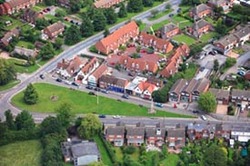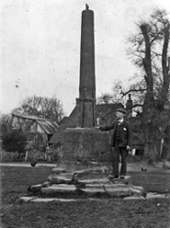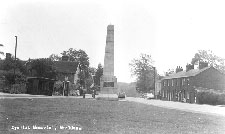
Meriden is situated at an historical crossing of route ways to the south of the main A45 Birmingham-Coventry road. It lies in a largely undeveloped area of agricultural land known as the 'Meriden Gap' which separates the conurbations of Birmingham and Coventry.
The original settlement, known as Alspath ('road to Al's dwelling') was on the hill to the east of the present-day village and was held by the Countess Godiva before 1066 and by Nicholas during the time of the Domesday survey of 1086.
The establishment of the London Road drew the centre away from the hamlet on the hill into the valley alongside the road. This was turnpiked in 1821 and Meriden became a coaching stage with several inns and ale houses. The A45 by-pass, opened in 1958, reduced the amount of through traffic, returning the road to local use through the village.
The centre of the village today is at the crossroads of the London Road with the Fillongley Road (Solihull to Nuneaton). It is along these two roads that development can be traced.
Growth in the 20th century was extensive. Between the wars, 'ribbon' development took place along the Fillongley Road and to some extent along Birmingham Road and Leys Lane. At the same time, the Millsons Wood development was constructed to the east. Since the Second World War, the pattern of development has been shaped by the roads, with Council and private housing developments having been built on the land enclosed by Fillongley Road, Birmingham Road and Leys Lane.
Between the censuses of 1931 and 1981, the population of Meriden parish increased from 912 to 2,341, an increase of 250% in 50 years. Almost all of this increase took place in Meriden village itself. By 2001, the population of Meriden parish had increased to 2,734.
Meriden was the home of the Triumph Motorcycle factory, which moved from Coventry during the Second World War. In July 1973, a new company - Norton-Villiers-Triumph - was formed and it was planned to move production to the BSA factory in Birmingham. A sit-in by workers at Meriden lasted for almost two years until March 1975 when a workers' co-operative was set up to manufacture the Triumph Bonneville, mostly for the American market. The factory finally closed in 1983, liquidators sold the company's assets and the site was cleared the following year for housing. The Triumph name lives on in a new company, Triumph Motorcycles Limited, based in Hinckley, Leicestershire.

Meriden cross
On the village green is a mediaeval stone cross, traditionally reputed to mark the centre of England. The cross is a scheduled ancient monument, known locally as 'The Stocks'
The Woodmen of Arden
The famous archery club, reputedly the oldest in England, was established at a meeting in the old Bull’s Head (Darlaston Hall) in 1785.
Cyclists' memorial
Also on the green is the National Cyclists' Memorial, commemorating all those cyclists who gave their lives in the First and Second World Wars.

The memorial was erected with subscriptions from cyclists and cycling clubs following a public meeting held in October 1919. It was placed in Meriden to make it easier for cyclists to reach it from anywhere in the country and is the site of an annual rally and service every May.
Links
- Meriden at British History Online
- Meriden Parish Council
- British Pathe news (Search for Meriden)
Further reading
Tales of Triumph Motorcycles and the Meriden factory by Hughie Hancox, 1996
Meriden: centre of England by Doreen Agutter, 1994
Meriden: its people and houses, part 1 by Doreen M.K. Agutter, 1990
Meriden WI: the first 50 years by Meriden Women's Institute, 1988
Meriden village study by Solihull Metropolitan Borough Council, 1986
Examination of Meriden community in 1881 by Ian R Smith, 1986
Pictorial history of Triumph motorcycles by Ivor Davies, 1985
Meriden : odyssey of a lame duck : a study of government intervention in the motor-cycle industry - the way the money goes by Jock Bruce-Gardyne, 1978
Check the online catalogue to see if the above books on Meriden are available at your local Solihull library.
Ordnance Survey maps 1886 to the present day are available at Solihull Heritage & Local Studies Service.
Let us know your memories of Meriden, however recent, by completing a memory sheet attached below.
